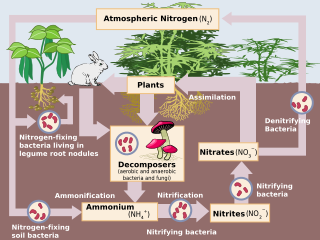What is the nitrogen cycle and why is it important?
1 Answer
The nitrogen cycle describes how nitrogen moves through the biosphere and atmosphere. It is important because living things require nitrogen.
Explanation:
Nitrogen cycles through the biosphere and the atmosphere through what is known as the nitrogen cycle. The major reservoir of nitrogen is the atmosphere, which is primarily made up of nitrogen. Atmospheric nitrogen cannot be used by most organisms and must be converted into a usable form. This occurs in nitrogen fixation.

The major changes nitrogen goes through are nitrogen fixation, nitrification, anammox, denitrification, and ammonification.
In nitrogen fixation, certain prokaryotes convert nitrogen gas to a form that can be used by other organisms (ammonia or NH3). This process can also occur due to human activities.
In nitrification, NH3 is converted to nitrite by microbes known as ammonia-oxidizers. This nitrite is then converted to nitrate by nitrite-oxidizing bacteria. This process occurs in aerobic conditions (conditions that require oxygen).
In anammox, nitrification occurs in anoxic conditions (conditions depleted of oxygen). Anammox bacteria oxidize ammonia so that is converted to nitrogen gas (N2).
In denitrification, nitrate is converted to nitrogen gas by prokayrotes typically in soils, sediments, anoxic areas of lakes and oceans. This is an anaerobic process (process that does not require oxygen) and is how nitrogen is returned to the atmosphere.
In ammonification, an organism dies and decomposers return inorganic nitrogen back into the environment in the form of ammonia.
Nitrogen is important for all living things. It is a component in DNA, proteins, and chlorophyll in plants. Disrupting the nitrogen cycle can lead to imbalances in ecosystems. For example, soils with too much nitrogen can become acidic. Increased nitrogen in aquatic systems can lead to eutrophication.

